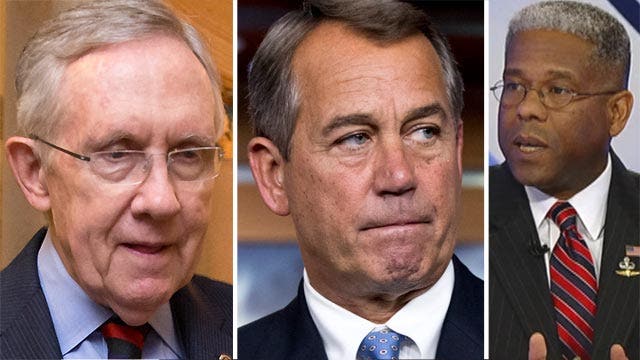Civility has a credibility problem in Washington
No wonder the partial suspension of government services shows no sign of ending - lawmakers can't even agree to be civil
The government slimdown enters its second week with Democrats and Republicans continuing to blame each other with no compromise in sight, as a second major budget deadline looms larger and closer.
Despite Treasury Secretary Jack Lew warning again Sunday about the potential “catastrophic” impact of Congress allowing the government to default on its debt on Oct. 17, Republican leaders made clear the House won’t agree on any deal to increase the county’s borrowing authority without concessions from President Obama.
Lew told “Fox News Sunday” such a strategy was “irresponsible” and “reckless.”
“Which is why Congress needs to act,” said Lew, calling on members to pass a temporary spending bill to reopen the government and pass a measure to increasing the nation's $16.7 trillion debt limit.
House Speaker John Boehner made a point Sunday of saying his GOP-led chamber has stayed on Capitol Hill two straight weekends to try to pass spending bills to keep the government fully operational, only to have them rejected by the Democrat-led Senate.
The upper chamber will try to vote this week on a bill that passed the House unanimously on Saturday to pay federal workers for days missed.
Boehner told ABC’s “This Week” that Obama is risking default by refusing to negotiate with Republicans and that he doesn’t have the votes to pass a debt-limit proposal free of other fiscal issues.
“We're not going to pass a clean debt limit increase,” he said. “The votes are not in the House to pass a clean debt limit, and the president is risking default by not having a conversation with us. … I’m ready for the phone call.”
Changes to ObamaCare, entitlement reform and other spending cuts are among the possible concessions for which Republicans might ask.
On Monday, the government slimdown enters its seventh day with hundreds of thousands of federal employees furloughed, national parks closed and an array of government services on hold. However, the Obama administration is calling back to work hundreds of thousands of civilian military workers.
Lew said Obama has not changed his opposition to coupling a bill to re-open the government and raise the borrowing authority with Republican demands for changes in the 3-year-old health care law and spending cuts.
Boehner insisted that Obama must negotiate if the president wants to end the shutdown and avert a default that could trigger a financial crisis and recession that would echo the events of 2008 or worse.
Boehner said he lacks the votes to pass a clean temporary spending bill. Democrats argue that their 200 members in the House, plus close to two dozen pragmatic Republicans, would back a so-called “clean” bill if Boehner just allowed a vote, but he remains hamstrung by his Tea Party-strong GOP caucus.
"Let me issue him a friendly challenge,” New York Democratic Sen. Chuck Schumer told ABC. “Put it on the floor Monday or Tuesday. I would bet there are the votes to pass it."
In a series of Sunday television appearances, Lew warned that on Oct. 17, when he exhausts the bookkeeping maneuvers he has been using to keep borrowing, the threat of default would be imminent.
"I'm telling you … Congress is playing with fire," he said.
Lew said that while the Treasury expects to have $30 billion of cash on hand on Oct. 17, that money will be quickly exhausted in paying incoming bills given that the government's payments can run up to $60 billion on a single day.
Treasury issued a report on Thursday detailing in stark terms what could happen if the government actually defaulted on its obligations to service the national debt.
"A default would be unprecedented and has the potential to be catastrophic," the Treasury report stated.
Private economists generally agree that a default on the U.S. debt would be extremely harmful, especially if the impasse was not resolved quickly.
Sen. Ted Cruz, R-Texas, a force in pushing Republicans to get changes to ObamaCare in exchange for keeping the government running, spelled out his conditions for raising the borrowing authority.
"We should look for three things. No. 1, we should look for some significant structural plan to reduce government spending,” he told CNN’s “State of the Union.” “No. 2, we should avoid new taxes. And No. 3, we should look for ways to mitigate the harms from ‘ObamaCare,” Cruz said, describing the debt ceiling issue as one of the "best leverage the Congress has to rein in the executive."
Asked how the standoff might end, Boehner said: "If I knew, I'd tell you."
The Associated Press contributed to this report.













































